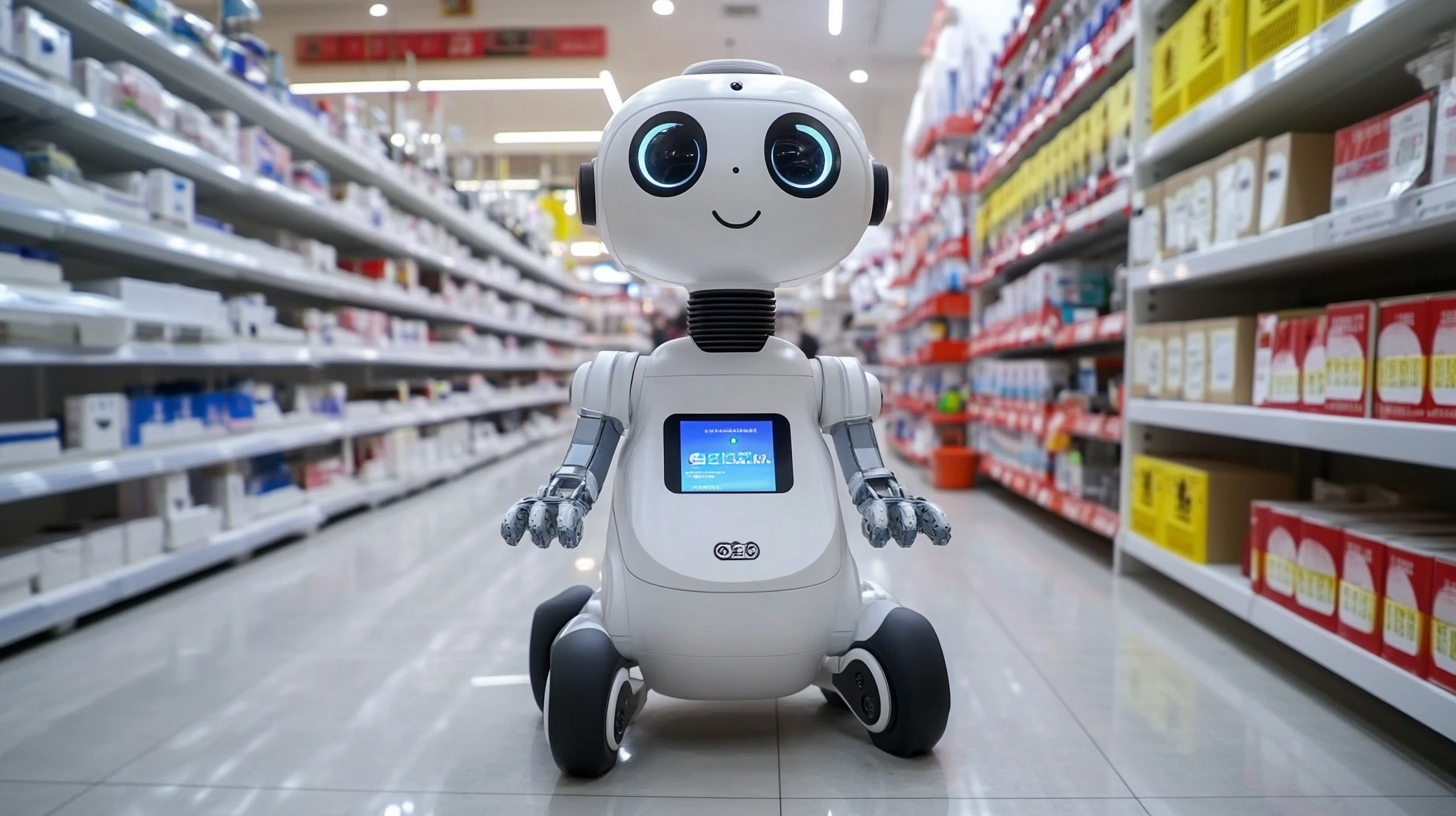Use it to plan your own robot barista payback period.

Want to know more details?
Please, contact your manager.
Aleksandr Maksimovich
Business Development Manager
Nalarobot Robotics | Nalarobot Café
Mobile: +375 333 760 460
(WhatsApp | Telegram | Viber)
BLOG
How to Identify Top Tier Production Robot Manufacturers for Your Business Needs
In today's rapidly evolving industrial landscape, the integration of automation has become crucial for businesses striving to maintain competitiveness and efficiency. At the forefront of this transformation are production robots, which offer unprecedented precision and speed in manufacturing processes. Selecting the right production robot manufacturer can significantly influence the operational efficiency and overall success of your business. However, with a plethora of options available in the market, identifying top-tier manufacturers requires an informed approach to ensure compatibility with your specific needs.
This blog aims to guide you through the essential criteria and strategies for recognizing the leading production robot manufacturers that align with your business objectives. From evaluating technological advancements and industry reputation to assessing customer support and service options, we will explore the key elements that contribute to making an informed choice. By the end, you will be equipped with the knowledge necessary to navigate the competitive landscape of production robots and make a confident decision that will propel your business forward.

Understanding the Different Types of Production Robots Available Today
In today's rapidly evolving landscape of automation, it's vital for businesses to understand the different types of production robots available. With advancements in technology, production robots have become increasingly specialized, addressing various industry needs. For instance, collaborative robots, or cobots, are designed to work alongside human operators, enhancing efficiency in assembly lines and minimizing the risk of workplace injuries. Reports highlight that the global market for collaborative robots is expected to grow significantly, projected to exceed a valuation of $12 billion by 2025, indicating a trend towards safer and more cooperative working environments. Moreover, the emergence of agricultural robots signifies how automation is transforming traditional practices. These machines assist in tasks ranging from planting to harvesting, thereby alleviating labor shortages and boosting productivity. According to recent industry analyses, the Agricultural Robot Market is anticipated to reach over $30 billion by 2026. This switch to automated tools reflects a larger trend in which businesses are increasingly relying on robots to optimize efficiency and reduce costs while promoting sustainable farming practices. In manufacturing, we witness innovations such as the KUKA robots in Midea's smart manufacturing park, which are capable of producing a robot every 30 minutes. This level of automation not only accelerates production rates but also enhances precision, signaling a shift towards fully automated production systems. As the integration of AI becomes more prevalent, these robots are expected to undertake more complex and autonomous tasks, paving the way for smarter factories. By recognizing these various types of robots and their associated capabilities, businesses can make informed decisions when choosing the right production robot manufacturers to meet their unique operational demands.

Key Features to Look for in a High-Quality Production Robot Manufacturer
When searching for a high-quality production robot manufacturer, there are several key features to consider that can significantly impact your business operations. First and foremost, assess the manufacturer’s experience and reputation in the industry. A company with a proven track record and positive reviews is more likely to provide reliable, efficient robots that meet your specific production needs. Additionally, it is beneficial to look for manufacturers that specialize in your industry, as they will have a better understanding of the unique challenges and requirements you face.
Another important feature is the range of customization options offered by the manufacturer. Every business has different processes and goals, so the ability to tailor a robot to fit your operations can provide a critical advantage. High-quality manufacturers often provide integration services to ensure their robots seamlessly work with your existing systems, maximizing efficiency and minimizing downtime. Furthermore, advanced technology and innovative designs should also be a priority. Look for manufacturers that employ cutting-edge automation solutions, as this can lead to enhanced productivity and superior performance in your production line.
Lastly, consider the level of customer support and training provided by the manufacturer. A reliable partner will not only deliver quality products but also offer comprehensive training and ongoing support to help your team effectively utilize the robots. This includes troubleshooting assistance, maintenance services, and regular updates on technology advancements. By focusing on these key features, you can identify a top-tier production robot manufacturer that aligns with your business needs and helps drive your operations forward.

Evaluating Manufacturer Reputation and Customer Reviews
When selecting a production robot manufacturer, evaluating their reputation and customer reviews is paramount. According to a 2021 survey by Robotics Business Review, nearly 70% of companies indicated that the reputation of a manufacturer significantly influenced their purchasing decisions. This data underlines the necessity of thorough research into manufacturers' histories, technological advancements, and overall standing in the industry.
Customer reviews also play a crucial role in this evaluation process. A report from MarketsandMarkets estimates that 82% of consumers read online reviews before making business decisions. By examining feedback from current and previous customers, businesses can gain valuable insights into a manufacturer's reliability, product quality, and customer service responsiveness. Platforms like Trustpilot and Google Reviews provide an excellent starting point for aggregating user experiences, helping companies discern where potential pitfalls may lie.
Furthermore, industry-specific rankings and awards, such as those published by the International Federation of Robotics (IFR), can be valuable indicators of a manufacturer's excellence. For instance, manufacturers that consistently rank in the top positions in annual reports are often recognized for their innovation and contribution to the sector. Engaging in online forums and professional networks also allows businesses to gain firsthand accounts and recommendations, further enriching the decision-making process. By prioritizing reputation and actively seeking out customer feedback, businesses can ensure that they partner with the right production robot manufacturers to meet their specific needs.

Assessing After-Sales Support and Maintenance Options
When searching for top-tier production robot manufacturers, assessing after-sales support and maintenance options is crucial for ensuring long-term operational efficiency. First, a robust after-sales support system demonstrates a manufacturer's commitment to customer satisfaction and product longevity. It's important to inquire about the availability of technical support, training programs, and response times to service requests. A manufacturer that offers 24/7 support and a dedicated team of experts can help minimize downtime and enhance the overall productivity of your robotic systems.
Additionally, maintenance options should be an integral part of your evaluation process. Look for manufacturers that provide comprehensive maintenance packages, which may include routine inspections, emergency repairs, and software updates. This proactive approach can significantly reduce the risk of unexpected failures and costly interruptions in production. Manufacturers that offer flexible maintenance schedules tailored to your operation’s needs can provide peace of mind, allowing you to focus on your core business activities without worrying about the reliability of your robots.
Ultimately, the right combination of after-sales support and maintenance services can be a game-changer for your business. Not only do these services enhance the performance and lifespan of your robotic systems, but they also reflect a manufacturer's dedication to continuous improvement and partnership. Make sure to prioritize these factors in your decision-making process to ensure you choose a production robot manufacturer that aligns with your operational goals.
Comparing Cost vs. Value in Production Robot Investments
When considering investments in production robots, businesses often grapple with the balance between cost and value. An effective investment strategy not only hinges on the initial expenditure but also on understanding the total cost of ownership (TCO) associated with robotic systems. According to industry insights, factors such as maintenance, energy consumption, and potential downtime need thorough analysis to gauge the true value derived from robotic investments.
Smaller manufacturers, noted for being a rapidly growing sector in industrial robotics, exemplify this balance. They often adopt collaborative robotics systems that provide significant operational flexibility and efficiency. By focusing on how these robots can enhance productivity and workforce synergy, smaller manufacturers are demonstrating that investing smartly in robotics can yield substantial returns, outweighing the upfront costs.
Moreover, as businesses increasingly aim to boost their digital and data foundations, the integration of robotics becomes vital. Technological advancements are shifting the landscape of manufacturing, making it essential for companies to prioritize investments that not only meet current operational needs but are also adaptable for future innovations. This proactive approach can lead to enhanced competitive advantages and better positioning within the evolving industry.

